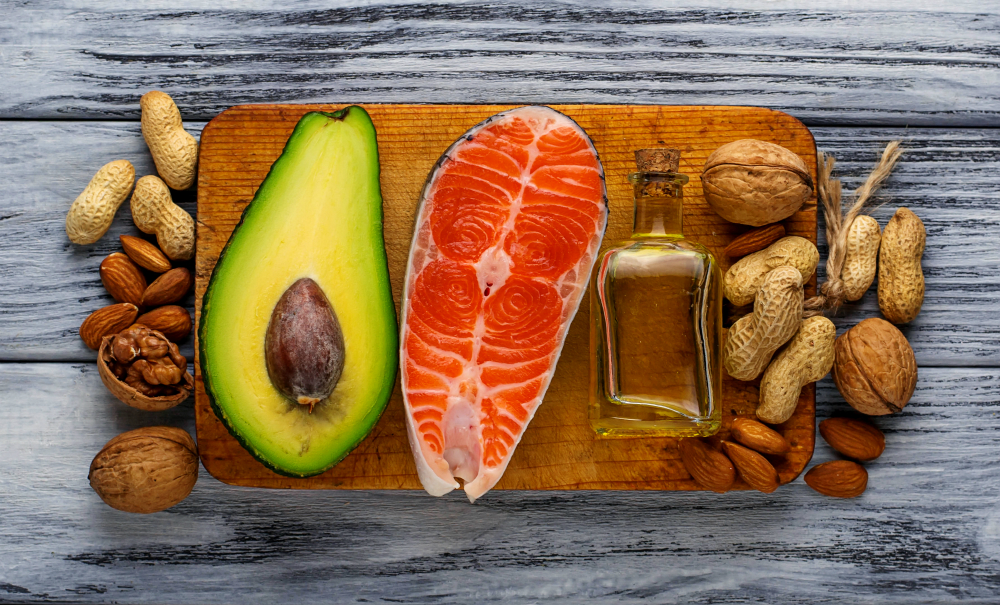Essential Fatty Acids
 Recently, we were allowed to sit with Amanda Nighbert, Registered Dietician and Lexington, KY resident, on two episodes of our podcast, Full Spectrum Living with CBD. We discussed nutrition as well as Omega’s rich in fatty acid.
Recently, we were allowed to sit with Amanda Nighbert, Registered Dietician and Lexington, KY resident, on two episodes of our podcast, Full Spectrum Living with CBD. We discussed nutrition as well as Omega’s rich in fatty acid.
What a wealth of knowledge! You have to tune in to get all the details, but when you do, you’ll be surprised to hear how we connect what she recommends nutritionally for her client’s health directly to the health of the Endocannabinoid System!
One of those recommendations is a good Omega 3:6 ratio. I’ve included excerpts from a blog post on Amanda’s website focusing on essential fatty acids (EFAs) – found in quotes. A link to the full blog can also be found below!
“Healing inflammation is the key to overall health; a great way to do this is by client’s improving your omega-6 to omega-3 ratio!”
Amanda Nighbert, R.D.
What are Essential Fatty Acids?
Essential fatty acids (EFAs) are fatty acids that cannot be synthesized by the human body, and therefore must be obtained from the diet. EFAs are necessary for a variety of bodily functions, and have been linked to numerous health benefits. In this article, we will discuss the types of essential fatty acids, their health benefits, and how to incorporate them into your diet.
Omega-6
Omega-6 and omega-3 are polyunsaturated fatty acids. Historically, our diets have been high in seafood and other sources of omega-3 and low in omega-6 oils. With the industrial revolution came an increase in omega-6 and a decrease in omega-3. This was due to the rise of the vegetable oil industry and changes to our livestock feed which in turn changed the fatty acid composition of our meat. Omega-6 fatty acids are found in vegetable oils such as sunflower and safflower oil. The most important omega-6 fatty acid is linoleic acid (LA).
The excellent news: endocannabinoids are produced from arachidonic acid, an omega-6 fatty acid. Having enough arachidonic acid is essential for endocannabinoid production. BUT terrible news: having too much may lead to the downregulation of cannabinoid receptors. And the MORE bad news: excessive omega-6 intake is also pro-inflammatory. So how can you win?
“Omega-6 and omega-3 fatty acids use the same conversion enzymes, meaning the more omega-6 we consume, the less omega-3 we convert and use. This has led to high tissue concentrations of omega-6 with low concentrations of omega-3, which creates inflammation and is associated with increases in CVD, obesity, diabetes, IBS/IBD, macular degeneration, rheumatoid arthritis, asthma, cancer (AKA, inflammatory diseases!).”
Amanda Nighbert, R.D.

“Omega-3 is an essential fatty acid, meaning it cannot be made by the body and must be consumed through the diet. ALA is the ‘parent’ form of omega-3 and is converted into its derivative forms, DHA and EPA. Both fatty acid. The benefits we experience from omega-3 are from DHA and EPA specifically. They play important roles in our cell membranes and cardiovascular and neurological health.”
Amanda Nighbert, R.D.
Omega-3
Omega-3 fatty acids are found in plant sources such as flaxseed, chia seeds, and walnuts. They are also found in fatty fish such as salmon, mackerel, and sardines. The most important omega-3 fatty acid is alpha-linolenic acid (ALA).
- Improved brain health: Omega-3 fatty acids have been linked to improved brain function and a reduced risk of neurodegenerative diseases such as Alzheimer’s and dementia.
- Lower risk of heart disease: Omega-3 fatty acid have been linked to a reduced risk of heart disease, as they can help reduce cholesterol levels and lower blood pressure.
- Improved skin health: EFAs can help keep skin hydrated and reduce the appearance of wrinkles.
- Reduced inflammation: Omega-3 fatty acids have been linked to a reduced risk of inflammation and autoimmune diseases.
- Improved mood: EFAs have been linked to improved mood, as they can help regulate hormones and neurotransmitters such as serotonin and dopamine.
Omega-3 deficiency has been associated with all of the following:
ADD, ADHD, Dyslexia, Depression, Weight gain, Heart disease, Allergies, Arthritis, Violent tendencies, Memory problems, Cancer, Eczema, Inflammatory disorders, Diabetes, Dry Skin, Dandruff, Postpartum depression, Alcoholism, Crohn’s disease, Irritable bowel syndrome.
Wow. So how do we incorporate omega-3 into our diets to provide the essential fatty acid and give our bodies the best chance to respond well to a CBD routine? Click the link if you are interested in learning what cannabinoids are.
Well, first of all, an ideal ratio of omega-3 to omega-6 in the diet is 1:1
“The optimal source of omega-3 is wild-caught seafood, specifically cold-water fish such as salmon, halibut, cod, herring, mackerel, and sardines. Grass-fed meat is another good source. This is an instance in which food quality does matter. Grass-fed meat can have up to five times the amount of omega-3 as
How to Incorporate Essential Fatty Acids into Your Diet
In order to get the full benefits of EFAs, it is important to incorporate them into your diet. Here are some tips for doing so:
* Eat fatty fish: Eating fatty fish such as salmon, mackerel, and sardines is an excellent way to get your daily dose of omega-3 fatty acids.
* Use vegetable oils: Replace butter and other unhealthy oils with vegetable oils such as sunflower and safflower oil.
* Cook with nuts: Cook with nuts such as walnuts and almonds, which are high in omega-3 fatty acids.
* Add flaxseed to smoothies and salads: Flaxseed is a great source of omega-3 fatty acids, and can easily be added to smoothies and salads.
* Take a supplement: If you cannot get enough EFAs from your diet, consider taking a supplement.
conventional, grain-fed meat!”
Also:
- Hemp seeds and hemp seed oil
- Chia seeds
- Flax seed (grind at home in a coffee grinder) and flax oil
- Eggs (pasture-fed or omega-3 enriched only)
“It’s important to remember that increasing omega-3 is ineffective unless you are also decreasing omega-6. We’re looking at an overall ratio- ideally of approximately 1:1- while decreasing omega-6 vegetable oils and increasing omega-3s.”
Amanda Nighbert, R.D.
Click the link to learn Everything you need about Hemp Seed Oil vs CBD oil.
Great tip!!
Be sure to listen to our podcasts this month, where we’ll dive further into this topic and many others! Also, be sure to visit Amanda’s website. If you have any questions, please comment below or email us!
Nutrition and CBD Part 1 of 2
This episode of the Full Spectrum Living CBD podcast is a two-part episode. Adriane, Jessica, and Meredith have invited a special guest: Amanda Nighbert, a registered dietitian. Both parts are all about CBD and nutrition. The trio and Amanda discuss and name certain foods that can induce inflammation within our bodies, in addition to the influence of antioxidants on the body. Click on the link to learn all about Nutrition and CBD.
Nutrition and CBD part 2 of 2
The Full Spectrum Living with CBD trio, Adriane, Jessica, and Meredith, bring back Amanda Nighbert to further discuss health nutrition and CBD. They discuss the importance of Omega 3, EPA, and how it links to gut health and the endocannabinoid system. Food and CBD have become an increasingly popular combination in recent years as research demonstrates the potential synergistic benefits of both on human health and well-being. Together, the two can create a powerful and effective balance in relieving physical ailments, helping to reduce inflammation and provide greater mental clarity. Many have experienced relief from joint and muscle aches, better digestion, and even relief from certain mood disorders such as depression and anxiety. While the research is still new, more studies find that combining CBD and proper nutrition can increase overall health and well-being, including better sleep, improved appetite, and more balanced metabolism. Ultima ately, food, and CBD provide a robust and complementary tool for supporting a person’s holistic wellness. Click on the link to learn all about Nutrition and CBD part two.

